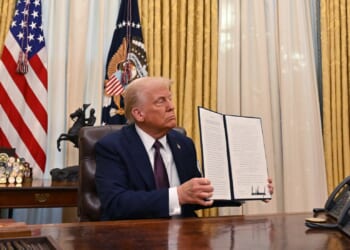In 1801 President Thomas Jefferson responded to a group of Connecticut merchants who objected to his appointment of a new collector of customs duties — the equivalent of tariffs. The prior holder of that office — Elizur Goodrich — had supported John Adams in the 1796 presidential election, and Jefferson appointed a member of his own political party as a replacement.
In Jefferson’s day there were only five executive agencies — State, Treasury, War, Navy and the Attorney General’s office.
The President reminded the merchants that under John Adams, his predecessor, members of Jefferson’s party “were excluded from all” offices. Casting the merchants’ objection as a claim that Goodrich had a right to hold office despite “the will of the nation, manifested” by his election, Jefferson asked “If a due participation of office is a matter of right, how are vacancies to be obtained? Those by death are few; by resignation, none.”
Jefferson’s words are an apt summary of the current debate over the role of DOGE, the Department of Government Efficiency, in attempting to make the federal government more effective and less a burden on taxpayers.
The principal objection to DOGE is that no one elected Elon Musk, its leader, to any office, but there is ample precedent for private citizens advising American presidents going back to Andrew Jackson and Martin Van Buren, founding fathers of today’s Democratic Party. The term “kitchen cabinet” was coined to describe Jackson’s circle of unofficial advisors; Presidents Kennedy and Johnson both had similar groups of outsiders who they turned to for counsel.
The other ground on which DOGE opponents rely is a mixture of practicality and principle; President Kennedy’s Executive Order 10988, issued in January, 1962, authorized collective bargaining by federal employees in the hope of enlisting them as a source of support for the Democratic Party, abandoning Franklin Roosevelt’s position that “government employees should realize that the process of collective bargaining . . . cannot be translated into public service.”
While prior executive orders can be revoked by a later president, there are limits to this power; subsequent executive orders cannot revoke properly adopted regulations that implemented a prior order, although they may direct an agency to review them with an eye to revising or withdrawing them.
The Federal Government in Jefferson’s Day
In Jefferson’s day there were only five executive agencies — State, Treasury, War, Navy and the Attorney General’s office. There are now over 400, and Jefferson’s complaint against King George III in the Declaration of Independence — “He has erected a multitude of New Offices, and sent hither swarms of Officers to harass our people, and eat out their substance” — is suffered nearly 250 years later as a self-inflicted wound. This wall of bureaucracy would have to be knocked down in order to effect real change in the federal workforce but, as Francois de Charette aptly put it, “Omelets are not made without breaking eggs.”
Jefferson’s observation in the early years of the American republic that no one ever resigns from a job in the federal government is an exaggeration, but not by much. The percentage of job separations — quits, layoffs, and discharges — in the private sector over the past two years ranges from 3.3 percent to 3.4 percent. For federal government workers the range is much lower — 1.3 percent to .9 percent.
This is understandable, given that the average annual pay of the federal workforce is $106,382, while the average annual earnings of private sector workers is $61,984. Add the fact that the cost of benefits for federal civilian workers are higher than those for their private sector counterparts at most educational levels, and you understand why what was true in Jefferson’s day remains true today.
Thomas Jefferson was both a gourmet and an oenophile. Let’s hope there’s something good cooking in the Trump kitchen cabinet.
READ MORE from Con Chapman:
Emma Lazarus: The Poet as Politician
Con Chapman is the author of Sax Expat: Don Byas.


![NYC Tourist Helicopter Falls into Hudson River, Siemens Executive and Family Among Those Killed [WATCH]](https://www.right2024.com/wp-content/uploads/2025/04/NYC-Tourist-Helicopter-Falls-into-Hudson-River-Siemens-Executive-and-350x250.jpg)






![Red Sox Fan Makes the ‘Catch of the Day’ with Unconventional ‘Glove’ [WATCH]](https://www.right2024.com/wp-content/uploads/2025/04/Red-Sox-Fan-Makes-the-‘Catch-of-the-Day-with-350x250.jpg)
![Green Day’s Cringe Trump Diss Ends in Fire and Evacuation [WATCH]](https://www.right2024.com/wp-content/uploads/2025/04/Green-Days-Cringe-Trump-Diss-Ends-in-Fire-and-Evacuation-350x250.jpg)






